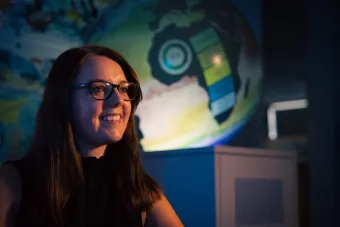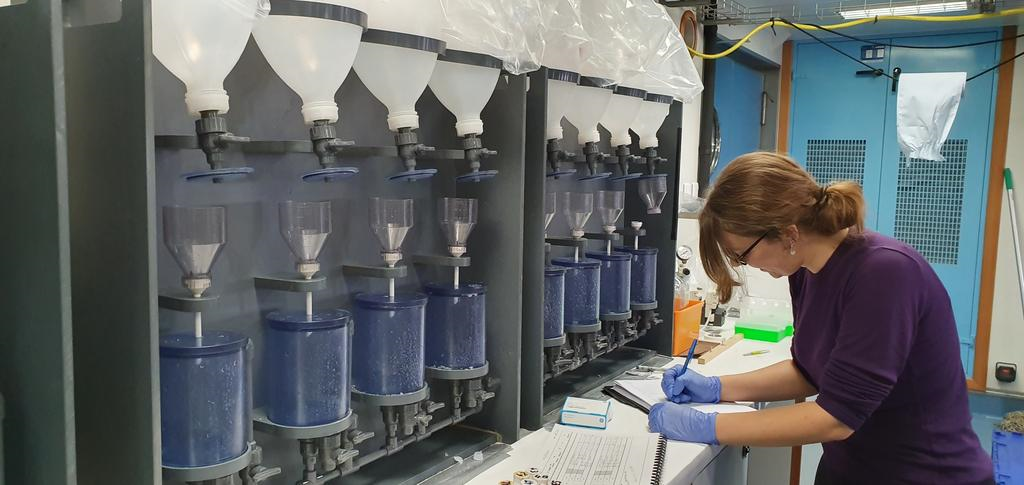
Our Marine Systems Modelling scientists are developing innovative, state-of-the-art models and use these tools to better understand and predict how our oceans work, addressing fundamental societal challenges.
For our latest Scientist Spotlight, we caught up with Marine Biogeochemist Dr Chelsey Baker, who uses these cutting-edge models to better understand the ocean carbon cycle, which helps to regulate our climate.
What is your role in research at NOC?
I am a Marine Biogeochemist and my research is focused on understanding biological controls on the ocean carbon cycle, specifically ocean carbon storage, using both models and observations.

What has been your path to working in this area?
I went to study Ocean Science at Bangor University for my undergraduate degree after reading a popular science article about ocean acidification and I wanted to learn more. I then moved to Southampton to study for a Masters in Oceanography with a focus on biogeochemistry. During my MSc I started working with researchers in NOC’s Ocean Biogeosciences group and had the opportunity to go to sea on a research expedition. After this taste of marine science research, I applied for a PhD programme at the University of Southampton and continued to work with researchers in the Ocean Biogeosciences group on ocean carbon storage. After my PhD I pivoted from observations to modelling and started a position as an ocean biogeochemical model analyst in the Marine Systems Modelling group at NOC in early 2020.
One of my career highlights has been attending COP28 in Dubai in December 2023, which was an exciting and somewhat unusual opportunity for an early career researcher. It was an amazing experience both professionally and personally. You can learn more about my time at COP.

What science are you currently working on?
Recently, I’ve been assessing how ocean carbon storage driven by biology may change in the future under a changing climate. This work focuses on assessing how a suite of models predict that primary production by phytoplankton and the fate of the carbon produced by plankton may change in the future. These models have not reached consensus in how the biological carbon storage in the ocean may respond to climatic changes and we are trying to determine what causes the different responses.
I’m also working on an emerging area of research which looks to assess the effectiveness and environmental impacts of proposed approaches to use the ocean to store carbon dioxide that has been actively removed from the atmosphere. Recent scientific reports, such as the IPCC report, have highlighted that in order to stay within the Paris agreement targets (to stay below 1.5–2 degrees Celcius of global warming) we will need to remove excess carbon from the atmosphere, known as carbon dioxide removal. We are using our models to assess the effectiveness and environmental impacts of some of these approaches to help inform the scientific community and policy makers who are working to rapidly assess the viability of these approaches.
What is your favourite thing about the work you do?
I really enjoy the diversity of my job – two days, weeks or months rarely look the same. I also get to constantly learn new skills (both technical and soft) and get to apply these skills to answer interesting scientific questions about the way our ocean works and how it may change in the future.
I also have to shout out the people that I work with! I am very lucky to work a lot of wonderful people who are passionate about the ocean and work together to carry out and facilitate exciting and cutting-edge science.

What impact does your science have on society?
My areas of scientific research aim to improve our understanding of the biological carbon cycle now and how it might change in the future. The role that the ocean plays in regulating our climate, by both physical and biological processes, is evaluated in IPCC reports and the global carbon budget. These assessments aim to determine where we are at now in terms of our anthropogenic (human caused) emissions and what our future pathways to reducing emissions towards net zero may look like. As mentioned above the role of marine carbon dioxide removal is now receiving a lot of interest to try and stay within our climate targets and we are working with the wider scientific community to rapidly assess these approaches to ensure any approaches that are deployed are effective and safe for our oceans and for society.
What one piece of career advice would you give to women or girls thinking about a role in science or engineering?
Just dive in (pun intended) and find good, supportive people to work with. When I started studying Ocean Science I had no career plan in mind and I had no idea at the end of my undergraduate degree that the job I do now existed. It was the support of those I’ve worked with during my postgraduate degrees and my first role at NOC along with a healthy dose of enthusiasm that has got me to where I am today.
More from Dr Chelsey Baker
Into the Blue
Chelsey featured on our Into the Blue podcast, joining Dr Zoe Jacobs to talk all things marine snow, and how important it is in feeding and maintaining the marine ecosystem.